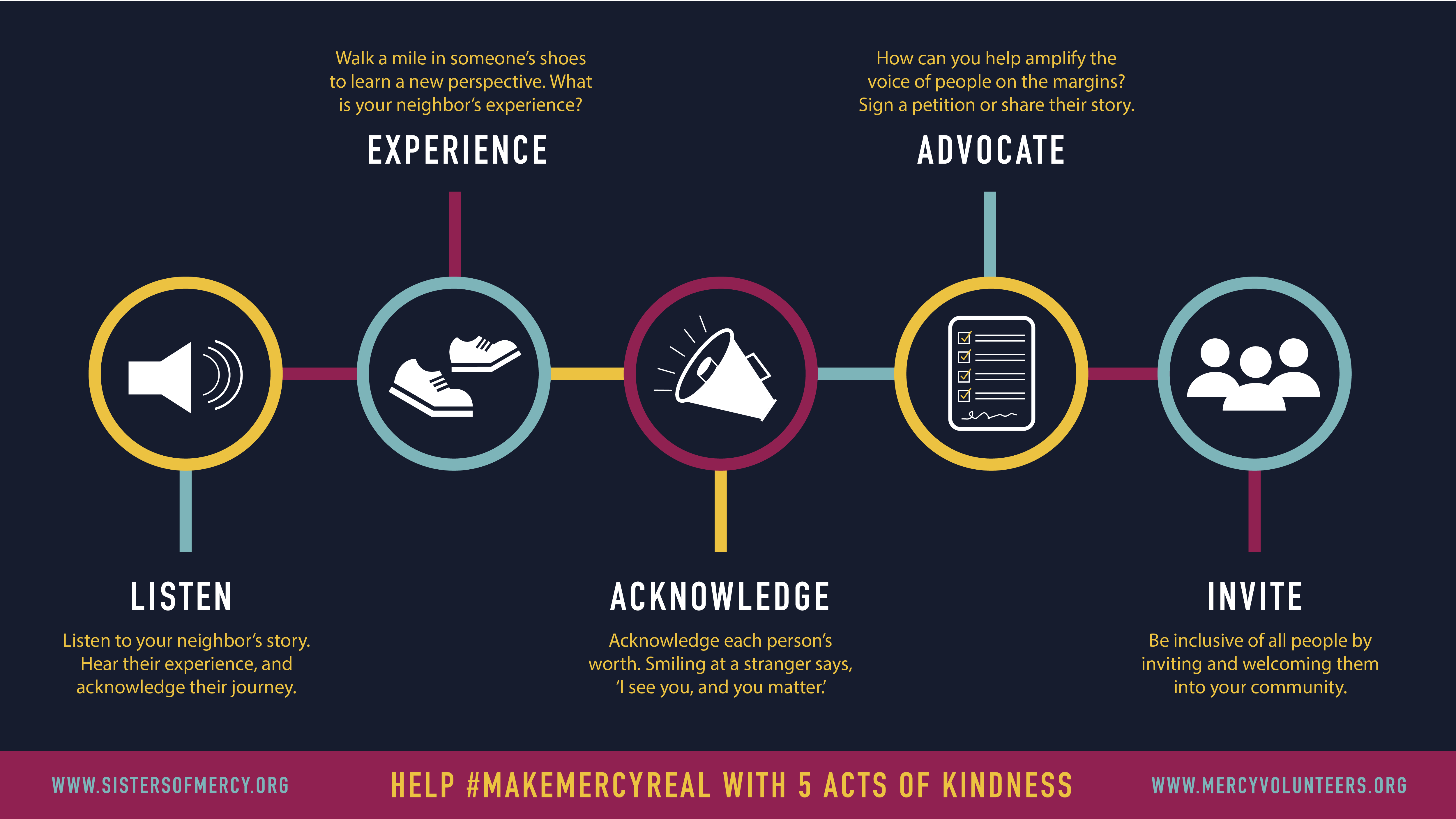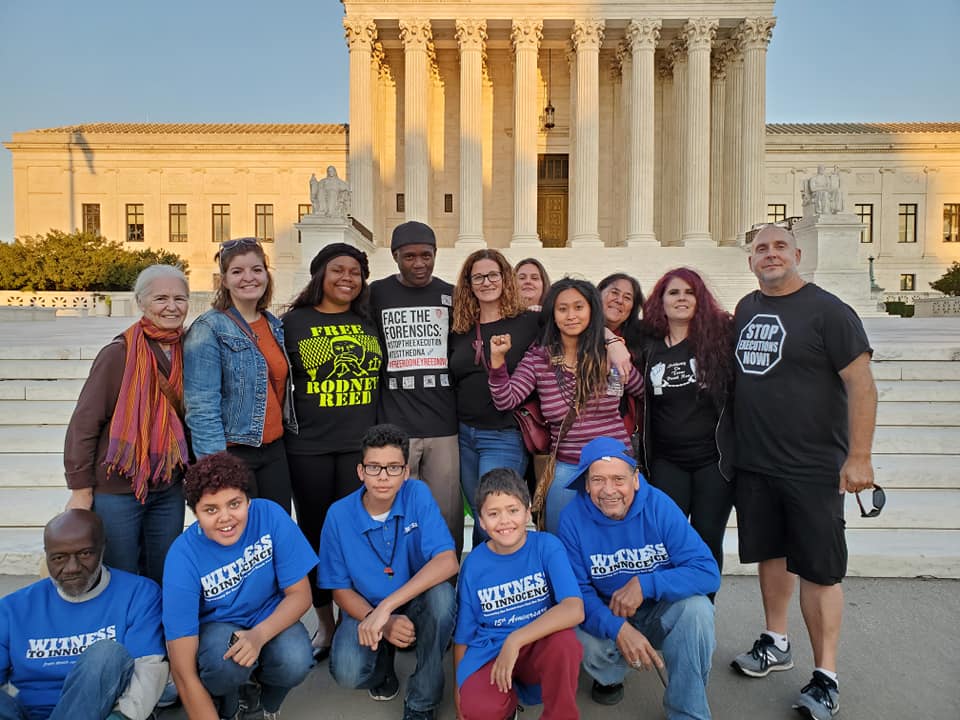This blog reflection is part of a year-long series that explores the ways people within our Mercy family and beyond find a way every day to #MakeMercyReal for themselves and for others.
For the past 43 years, Mercy Volunteers have walked with people on the margins of our society. Through their work in education, health care and social services, Mercy Volunteers commit to listening to the stories of the marginalized, amplifying their voices and advocating for them in a myriad of ways. Their example provides us with simple ways we, too, can make mercy real.
Listen
One of the first things Mercy Volunteers learn at their service sites is to listen to the powerful stories of people on the margins. Ben Dylik, who served at Cabrini Clinic in Detroit, Michigan, says he struggles with conversations about who “deserves” rights and social welfare. “The Peruvian liberation theologian Fr. Gustavo Gutierrez said, ‘You say you care about the poor, then tell me what are their names?’ With this quote on my heart, I used my year of service to talk with and understand the unique patients who came to my service site,” says Ben.
Through these conversations, Ben learned how inefficient public transportation affects his client’s ability to make it to doctor’s appoints, and how fear of ICE plays a significant role in mental health and anxiety.
By simply listening to people’s story, you, too, can give them a voice.
Experience
Living in solidarity with people who are poor and marginalized allows volunteers to truly experience the daily reality of those in their community. Mercy Volunteer Megan Petersen volunteered in Guyana, South America, writing, “Being foreign becomes your new middle name. It’s incredibly humbling as you have to learn to trust your gut and the hospitality of strangers around you.”
She reflects on her time serving at Mercy Wings Vocational Center with young adults who have fallen through the cracks of the traditional education system. Megan, who feels humbled by the hospitality extended to her in a new country, says learning to walk a mile in her students’ shoes has taught her to better understand their experiences and created a sense of vulnerability between them.
“These little shared moments of mutual learning and laughter have become my favorite moments in Guyana,” she says. “It’s a wonderful experience that sometimes stretches my patience but more than anything has strengthened my soul.”
Taking time to experience what it is like to be foreign or other allows us to fully understand those around us.

Acknowledge
Serving the homeless population with Faithful Fools in San Francisco, California, provides a unique opportunity to acknowledge each person’s inherit worth. Mercy Volunteer Jolie Slater writes, “The Fools’ mission statement resonated with me: To acknowledge each human’s incredible worth by being aware of our own judgments. Faithful Fools reaches people by shattering myths about those living in poverty…” She continues, “In only a few months, my eyes have been opened and my heart has been expanded as I have come to better understand the reality of those who call the Tenderloin [San Francisco] home.”
By acknowledging the worth of each person, we are able to say, “I see you, and you matter” regardless of homelessness, addiction, immigration status or social barrier.
Advocate
Mercy Volunteer Mary Kate Masterson serves as an advocate for death penalty abolition with Witness to Innocence in Philadelphia, Pennsylvania. On World Day Against the Death Penalty, she wrote, “I listened as people shared stories of working for years with people on death row, only to witness their executions and feel like their work meant nothing in the end. These stories were filled with so much pain that I found myself unable to hold back tears many times.”

Mary Kate noted that while these conversations set her heart on fire, advocacy is mostly about the small, day-to-day tasks. “Executions are stopped one appeal at a time. The death penalty is abolished one state at a time,” she says. Meantime, “we hold on to the passion and the small moments of honoring each person’s human dignity and right to life.”
Through advocacy such as signing petitions for appeals, these small changes are possible.
Invite
So often people on the margins feel they are outside of the community and are waiting for a simple invitation in. Through intentional actions, we can create more inclusive spaces. Louisa Keenan volunteers as a case manager with immigrants and refugees in Pittsburgh, Pennsylvania, doing everything from apartment hunting and public transportation orientation to scheduling appointments. She also spends a lot of waiting inside government offices.
“My job is ensuring that refugees feel empowered and welcome by bringing them into the community, creating space where those on the margins are welcome, safe and feel a sense of belonging. It is a space full of diverse experiences, lifestyles and traditions.”
It is through this intentional relationship building, one conversation at a time, that great communities are born.
To listen, experience, acknowledge, advocate and invite one person is to make mercy real. Finding space for intentional conversations, signing a petition or asking someone living on the streets how his day is going are just a few of the small ways we can spread kindness today.